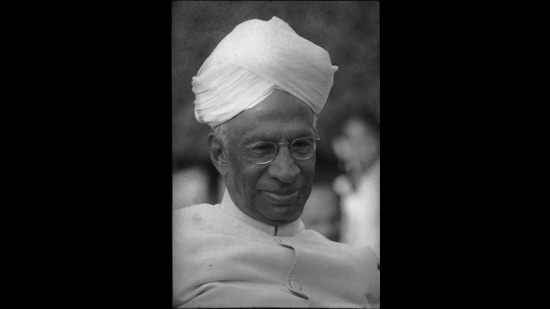S Radhakrishnan: A man of egoless impartiality
Constitutional authorities should be impartial guardians, capable of standing apart from the government if need be. Who or what determines that “need be”?
Teachers’ Day or Sarvepalli Radhakrishnan’s birthday was on September 5. So, writing this column about our philosopher-president may be a little late. But the weeks and months before he relinquished the office of the President of India on May 13, 1967, and immediately after, merit, in this 75th year of our Independence, recapitulation independently of the birthday.

Shortly before he left Rashtrapati Bhavan, his stature soared higher than its already great height. His re-election to a second term seemed almost certain. But in his Republic Day eve broadcast that year (1967), Radhakrishnan spoke his mind. Calling the past year, which had been through a crippling drought, the worst since Independence, he said: “…even after making allowance for all the difficulties of the situation, we cannot forgive widespread incompetence and the gross mismanagement of our resources”. The Opposition used the observation in the rallies that were taking place for the elections that year. The Congress won but was mauled. The Opposition to the Left and the Right declared their support for a second term for Radhakrishnan. But his equation with Prime Minister (PM) Indira Gandhi, not surprisingly, ran into difficulties. And soon, it was clear that though Congress president K Kamaraj was emphatically in favour of Radhakrishnan, the PM seemed inclined to favour the vice-president, the distinguished Dr Zakir Husain.
Radhakrishnan was not one to press his case and soon made it clear that he wanted to retire. Derek Hill, an outstanding portraitist, was commissioned to create a painting of the statesman for All Souls College, Oxford. The work, which hangs in that college library, shows the withdrawn yet happy resignation on his face.
Having demitted office as India’s second president, he retired to what was effectively his hometown, Madras, as Chennai was then called. The scholar-teacher in him chose not to linger in New Delhi, seeking sanctuary in one of Lutyens’ bungalows through the patronising indulgence of the incumbents of high office. As vice-president for 10 years (1952-1962) and then as president (1962-1967), he had seen and understood the Capital for all it is and has been – the pavilion of power and its shadow plays.
With his priceless and countless books, his son (the historian Sarvepalli Gopal) and his daughter-in-law, 79-year-old Radhakrishnan returned to ‘Girija’, the gracious home he had built way back in 1934 in Mylapore, by the sea on the marina. He had made it when he was vice-chancellor of Andhra University and hoped to serve Madras’s provincial government as director of public instruction. Instead, he was denied the position, an Englishman senior to him in the Indian Educational Service being appointed to it – just as well for him. He was now returning to it as a former head of the Indian State, who had gained worldwide recognition and one who, as Rashtrapati, had brought a rare distinction to that office, seeing three PMs into office – Jawaharlal Nehru, Lal Bahadur Shastri and Indira Gandhi. And two wars – the Sino-Indian war of 1962 and the India-Pak war of 1965, the first giving India deep trauma and the second a sense of victory and vindication.
Madras welcomed its Telugu son with warmth. Chakravarti Rajagopalachari, older by a decade, and a former incumbent, as Governor General of India, of the house Radhakrishnan had just vacated in Delhi, sent him a welcome message. Saying he need not lavish fresh praise on Radhakrishnan as he is venerated already, Rajaji quoted Shakespeare from King John:
To gild refined gold, to paint the lily,
To throw a perfume on the violet,
To smooth the ice, or add another hue
Unto the rainbow, or with taper-light
To seek the beauteous eye of heaven to garnish,
Is wasteful, and ridiculous excess.
But the emptiness of retirement soon took over. S Gopal writes in his amazingly objective biography of his father: “A succession of grey hours took the place of years of public recognition and acclaim”. Then, in September 1968, not long after his birthday, he suffered a stroke.
By the time he heard of the Templeton prize for Progress in Religion being given to him, his formidable mental powers had gone into a region where none could reach.
Every governor, vice-president and president of India may with benefit ponder these words of his biographer-son Gopal: “In his five years as the country’s president…the people learned to look to him as the impartial guardian of the public interest, befriending and advising the government but also capable if need be of standing apart from it”. And this without transgressing the letter or spirit of the Constitution.
Constitutional authorities should be impartial guardians, capable of standing apart from the government if need be.
Who or what determines that “need be”?
Egoless impartiality.
Gopalkrishna Gandhi is a former administrator, diplomat and governor The views expressed are personal
All Access.
One Subscription.
Get 360° coverage—from daily headlines
to 100 year archives.



HT App & Website






